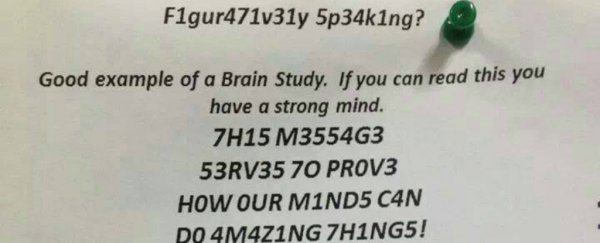
The above passage, written in a combination of letters and numbers, has been circulating social media for years and purports that only certain 'strong minds' can read it. That's not exactly true - just about everybody can read the message with ease. But according to one scientist, our ability to read such messages reveals something pretty incredible about the brain.
Interpreting passages like this hardly activates the section of the brain associated with numbers, Jon Andoni Duñabeitia, part of a team of Spanish cognitive scientists who wrote five papers on the subject, told Business Insider. Instead, our brain knows to treat them like letters based on their similar appearance.
"While reading, you dont pay attention to the difference between a number and a letter because you only expect letters," Duñabeitia said.
As people read the message, they're able to decode the oddly shaped "letters" in a matter of milliseconds because the human brain essentially treats the digits like letters written by someone with bad handwriting or in an unusual typeface, Duñabeitia said.
"For your brain, it's not a number in a word, it's a wrongly written or strangely written letter," Duñabeitia said. "You are in this mode of tolerance that allows for small distortions in the identity of the letters."
The phenomenon is nothing new. Netizens from the early days of the Internet are well familiar with '1337' or 'leet speak', an alternative alphabet used by online communities to evade detection by search engines. Duñabeitia also cited promotional emails that would advertise products like 'v1agra' to get around spam filters.
Although, there may be some truth to the idea that some people are more adept at reading leet speak than others, he said.
Young people, who have grown up using computers with endless typographical choices, may find it second nature. On the other hand, an older person, likely raised using standardised cursive, could find deciphering these messages a little tougher.
"But as long as we are proficient readers, we won't have a problem," he said.
This article was originally published by Business Insider.
More from Business Insider:
